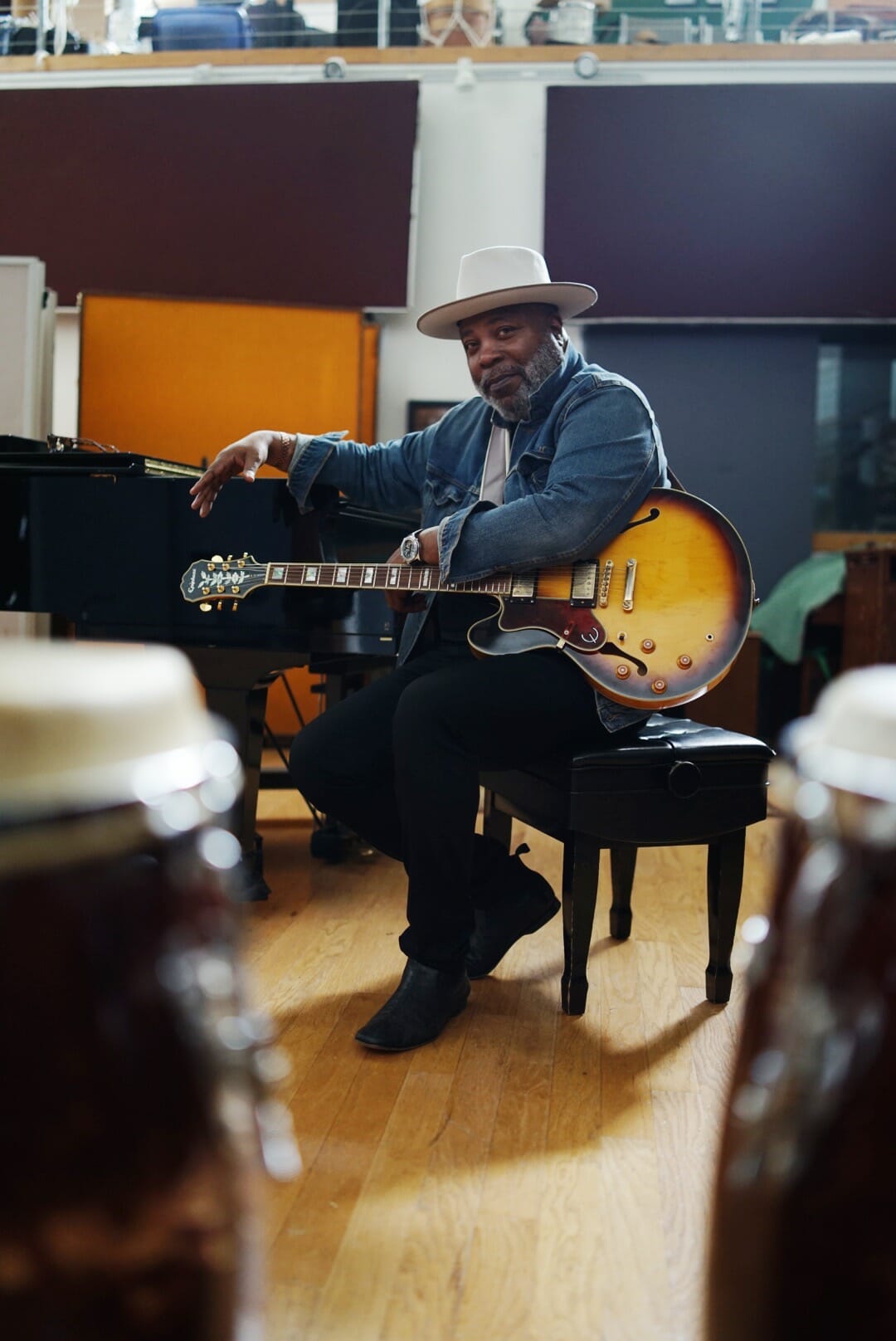Swing Time: Grant Green Jr. Explores the Songs of Burt Bacharach

When Grant Green Jr. was a kid, he used to delight in watching his dad—one of the most renowned guitarists in jazz—play his instrument.
However, while the younger musician would eventually pursue his own career on the same instrument, he didn’t receive a single lesson from his father.
“My dad never taught me one thing on the guitar—not one thing,” Green says. He laughs about it now because there are no hard feelings. His dad—whose many LPs for Blue Note Records in the ‘60s helped to define the sound of modern jazz guitar—had the boy’s best interests at heart. “My dad never wanted me to be a musician,” Green explains. “He wanted me to be a doctor or a lawyer. The music business is tough; it’s a hard life. And when he was coming up, with all the drugs and stuff, it was really tough. He didn’t want to see me go through that. But I was determined.”
So determined, he says, that he “would watch him play and then I would go home and mimic everything that I just saw him do. And from that point on, he started taking me seriously. But he still never taught me nothing on guitar.”
Green is now 67 years old and has long enjoyed a successful career of his own as a jazz guitarist. His newest release, Thank You Mr. Bacharach, takes a deep dive into the music of Burt Bacharach [who passed away on February 8], including numbers popularized by Dionne Warwick such as “Walk on By” and “Anyone Who Had a Heart,” as well as “The Look of Love,” a hit in America for both Dusty Springfield and Sérgio Mendes. Green also takes a stab at “Wives and Lovers,” a selection made famous by vocalist Jack Jones. Fortunately, although he does sing, Green wisely cut that one as an instrumental, avoiding the overtly sexist Mad Men-ready lyrics penned by Bacharach’s main writing partner, Hal David.
The album was cut live in an Atlanta-area studio, rather than patched together one instrument at a time, the way so many recordings are made today. “I have to interact with the musicians,” Green says. “Sometimes, somebody else will get an idea. Then we can try that idea out. I love the camaraderie.”
Growing up with a famous musician as a parent, Green was accustomed to seeing other well-known players visiting his family’s home, including fellow Blue Note artists like Stanley Turrentine and Lou Donaldson. One friend of Green’s father, George Benson, did show him a few things on guitar. Ultimately though, the younger musician realized that he needed to find his own style and sound—that playing the instrument the same way his father did would only invite comparisons. “If my last name is Green,” he says, “and I’m his son, they’ll always compare you. If I had played another instrument, it would’ve probably been easier.”
Expanding his sphere of influences beyond jazz was one way that Green ensured that his own playing encompassed ideas unlike anything his father did. He cites Jeff Beck, Yes’ Steve Howe and the lesser known Buzz Feiten as some of his favorite guitarists. And simply by virtue of the fact that he grew up in Detroit in the ‘60s, Green couldn’t help but be influenced by the Motown artists. In fact, Stevie Wonder, whose parents were the Greens’ next-door neighbors, was a friend.
“I knew Stevie quite well. His brother and I used to have a band,” Green says. He tells of one incident where, after a Wonder concert, the superstar’s parents threw a party at their home. “They had a champagne fountain. I had never seen a champagne fountain before and I thought that was the coolest thing ever,” Green says. Things got a tad out of hand, however, when Wonder “got a little tipsy” from putting his mouth directly under the fountain and ended up wrestling with Green on the floor. “There was this lady, and she kept screaming, ‘Be careful; don’t hurt Steve!’ Meanwhile, he’s choking me!”
Green has a whole backlog of stories he likes to tell, including the time he went to a Grateful Dead concert in New York City, where he was living at the time. Invited to hang out in Bob Weir’s hotel room afterward, Green brought along his guitar. One associate of Weir’s cautioned him to stay out of the way when the other musicians jammed—to just play quietly behind them. Instead, the jazz-trained player broke into a sweet rendition of the Erroll Garner-written standard “Misty.”
“Bob came and sat in front of me and crossed his legs and just watched me play,” Green says. “The guy who’d told me not to play just fell on his face. I mean, who says that to somebody? I never found out who he was and never saw him again, but I sure remember Bob Weir sitting there and just watching me.”




















